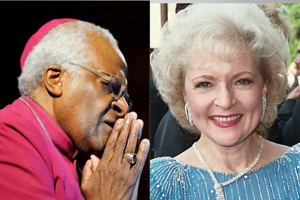Seconds after I started my car and flipped on NPR, the news of Bishop Desmond Tutu’s passing grabbed my attention. The interesting thing is that during my 35-minute drive from Charlottesville, Virginia over to my hometown, Staunton, I learned more about Bishop Tutu than I ever have.
As we know, it’s standard practice this time of the year for the media to list the names of well-known people who died that year. For 2021, the names of Colin Powell, Bob Dole, Cicely Tyson, Hank Aaron and others dominate the lists. Add three more names as I write this; Senator Harry Reid, football’s John Madden and the beloved actress, Betty White.
The USA Today’s David Colton in his year in review, PASSAGES, described the high-profile ones as “social influencers. “Regardless of whether they lived beyond 100 or died young, their example will endure,” wrote Colton.
Now until I read a recent head-scratching piece by author Tim Wise, “Ways to Stay Strong When Society is Breaking,” the thought of these social influencers “earning” their deaths never crossed my mind.
“We must embrace our mortality because when we run from it or try and deny it — a common human tendency — we fail to live lives of purpose,” wrote Wise. “Because we’re too busy trying not to die.”
Wow, too busy trying not to die! Let that sink in for a minute.
Continued Wise, “Life is beautiful, but it’s first and foremost tragic, precisely because that beauty will not last for any of us, and because we often squander it when here. James Baldwin explained this far better than I could in The Fire Next Time, so I’ll just let him do it.”
Life is tragic simply because the Earth turns, and the sun inexorably rises and sets, and one day, for each of us, the sun will go down for the last, last time. Perhaps the whole root of our trouble, the human trouble, is that we will sacrifice all the beauty of our lives, will imprison ourselves in totems, taboos, crosses, blood sacrifices, steeples, mosques, races, armies, flags, nations, in order to deny the fact of death, which is the only fact we have. It seems to me that one ought to rejoice in the fact of death — ought to decide, indeed, to earn one’s death by confronting with passion the conundrum of life.
“Did you get that last bit? Reread it, seriously,” asked Wise. “One ought to rejoice in the fact of death? To decide to earn one’s death by way of the life we lead?”
“I cry every time I read that line because it answers for me that question we all ask at some point about the meaning of life. Life is about justifying the space we took up, the resources we used, the oxygen we thieved from others who might have used it more productively.”
Humm, “earning” one’s death? Stop right there please.
I had a tough time wrapping my head around that notion. I mean, did those who sacrificed their lives in the struggle for human rights – Bishop Tutu, Viola Luzzio and Dr. King among them – “earn” their deaths? Did the thousands who lost their lives to COVID-19 “earn” their death certificates? Did the hundreds of thousands of Haitians who perished from devastating hurricanes “earn” their deaths?
C’mon now Mr. Baldwin, is “earn” the appropriate word here?
Look, Merriam-Webster dictionary defines “earn” as receiving something in return for effort and especially for work done or services rendered. So, taken that definition literally, is death the reward for “services rendered?” Well, that’s a bit of a stretch for me.
Switching now to thinking about one’s mortality, let alone writing about it, I’m here to tell you that’s no easy task. The thought can cause discomfort. But if we accept mortality – of course we have no other choice but to accept it – as an opportunity to reflect on the beauty and sacrifices of one’s life and unique accomplishments, then “earning” becomes a bit more palatable. My hunch is that’s the real meaning of the Baldwin quote.
So rather than quibble over semantics – “earned” versus something better -like I admit to doing, let’s direct our attention to the impressive biographies and stelar accomplishments of those who are no longer with us, including those far less known.
Now as we enter into a new year, let’s soldier on – you, me, all of us- through a lagging global pandemic, political, economic and social upheaval and painful personal losses.
So rest in peace Betty White, Colin Powell, John Madden, Desmond Tutu, Harry Reid, Cecily Tyson, and all the rest.
Now one last personal quibble – If any of you insist on sticking with the word “earned,” I’ll insist on tagging it with the word “accolades.”
Farewell to those we lost and Happy New Year to those who remain!

